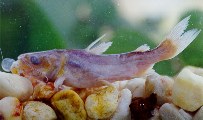
|
Cathorops spixii (Agassiz, 1829) Madamango sea catfish |

|
|
photo by
Camargo, M. |
| Family: | Ariidae (Sea catfishes), subfamily: Ariinae | |||
| Max. size: | 30 cm TL (male/unsexed); max.weight: 97.5 g | |||
| Environment: | demersal; brackish; marine; depth range 1 - 50 m | |||
| Distribution: | Western Atlantic: Atlantic and Caribbean rivers and estuaries from Colombia to Brazil. | |||
| Diagnosis: | 3 pairs of barbels on rostral region, 2 pairs on lower jaw, 1 pair on posterior end of maxilla; body dark brown or black dorsally, pale yellow ventrally; fin membranes brown, with small black spots (Ref. 13608). Head is widely flattened from above, nostril rounded, mouth inferior. The cephalic surface hardly reaches the level of the eyes (Ref. 35381). | |||
| Biology: | Found in shallow coastal marine waters and brackish estuaries, lagoons and river mouths. Also in hypersaline waters (Ref. 5217). Feeds mainly on invertebrates and small fishes. Juveniles feed on amphipods, isopods and copepods (Ref. 35381). Flesh considered good quality (Ref. 5217). Sold locally. | |||
| IUCN Red List Status: | Not Evaluated (N.E.) Ref. (130435) | |||
| Threat to humans: | traumatogenic | |||